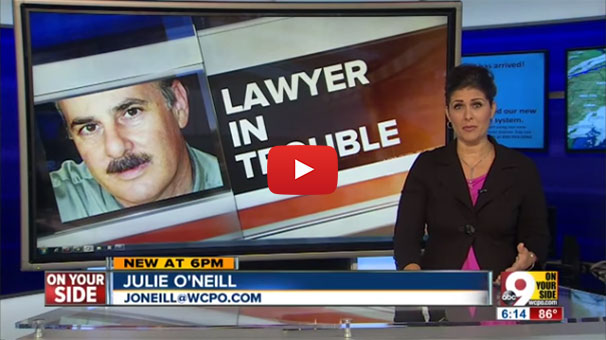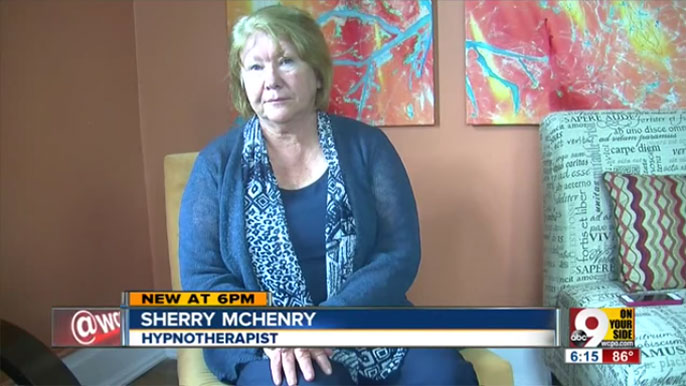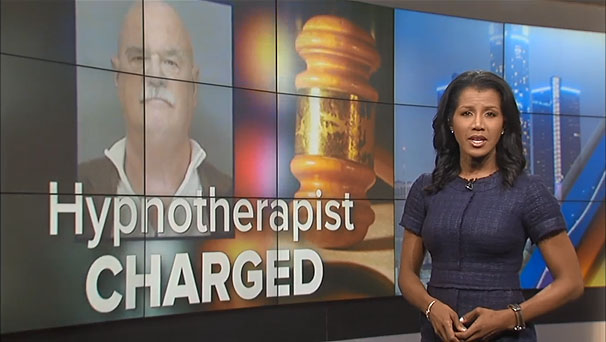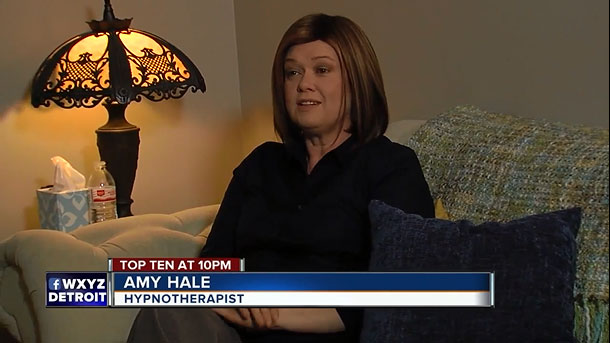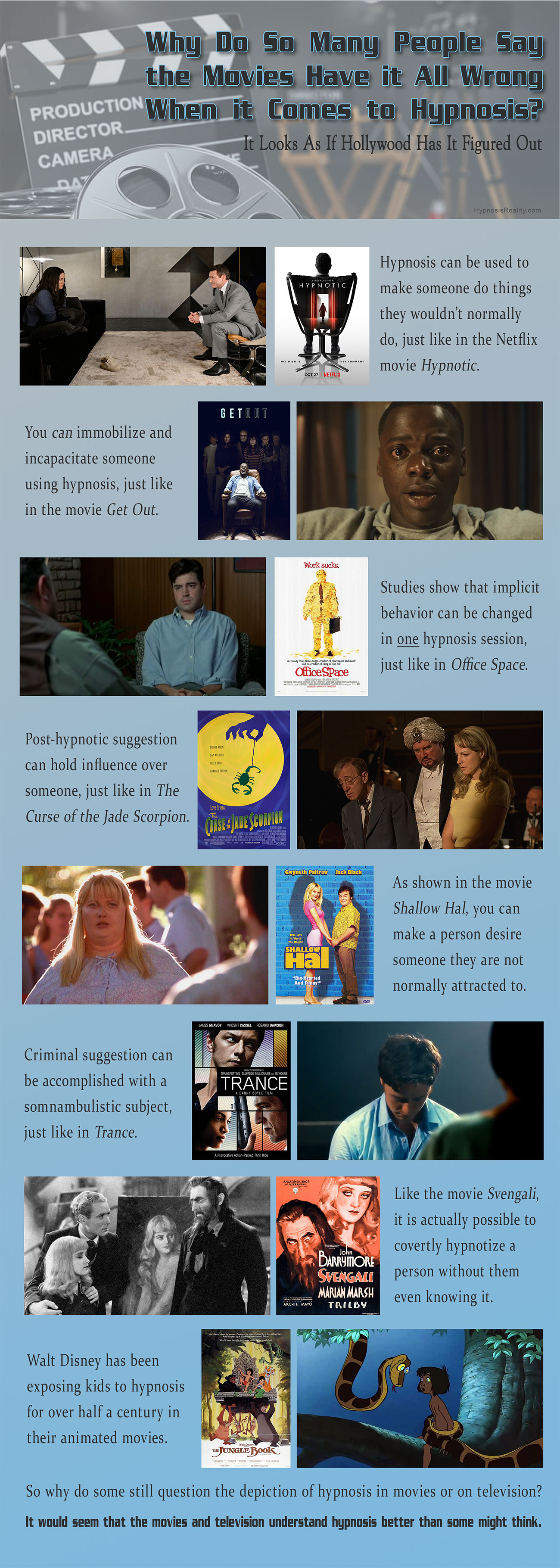|
|
|
 |
Links This Therapist Hypnotized a Patient (Ready to Glare)
|
|
HypnosisReality.com, Op-Ed, posted January
29, 2020 The Media Can Oftentimes Make Everything Worse Hypnosis assault is arguably one of the most horrific crimes that can ever be committed upon another human being. Those that have had to endure the imposition of such a despicable mental and physical assault understand and know full well the weight of such a statement, however, at the worst moment in their life, there are always others who are ignorant to the crime and do nothing but wrongfully perpetuate hypnosis ignorance, while insensitively compounding the agony for the victims. There has been a tragic misunderstanding of hypnosis over the years and that has created some serious problems for society. Unfortunately the current ignorance of hypnosis gets put on display far too often by an equally obtuse media when it comes to explaining how or why hypnosis crime can exist, especially in an environment where this is (allegedly) not supposed to be possible, let alone actually happen. The media clearly doesn't understand what is going on and they actually worsen everything further by reaching out to someone else who is equally clueless and also doesn't know what is going on, yet they are willing to postulate or pontificate on the subject, despite a lack of true understanding. The media is directly responsible for bringing us incompetent commentary from hypnotists who don't know any better, because the media itself doesn't know any better. They simply don't realize or understand that there is an extreme dichotomy of skill that exists among hypnotists. They don't know about the vast chasm that exists regarding experience and expertise, otherwise they would probably scrutinize their subject matter witnesses a bit more before putting them on-air. If indeed they were looking for a subject matter expert, they might have looked to professionals such as Dr. David Spiegel from Stanford University, Dr. Daniel Brown of Harvard University, or Professor Alan Scheflin of Santa Clara University, but instead they myopically reach out to a local hypnotist who just doesn't have the knowledge, experience, nor the expertise of the aforementioned experts. There are two cases in particular where this very much appears to be prevalent and the subject matter experts did not help clarify the situation at all - they actually ended up insulting the victims. I will also say right up front, these are women experts who are saying such things, not men. The Michael Fine Case Let's look first at the Michael Fine case from Sheffield, Ohio. WCPO News reported on the case and also contacted a local hypnotherapist to comment as well. It is the commentary from the alleged expert that does not sit well with rape victims. It should be noted that this is not really the hypnotherapists fault, per se. It would've been nice had WCPO simply chosen a much more knowledgeable expert. The above video is from WCPO in Cincinnati, Ohio. The alleged subject matter expert on hypnosis is Sherry McHenry who at the time of the interview had practiced hypnotherapy for 20 years. The news team is trying to make sense of the crime. McHenry suggests that she understands how it happened by saying, "It is a matter of him gaining trust." One has to immediately challenge the inference of that statement, because Ms. McHenry should understand that "trust" is part of ALL hypnosis - even with her own clients. Trust is obviously a big part of the arrangement when you see a hypnotist, so for her to insinuate that these women gave him their trust is not a very well thought out answer and is utterly disingenuous to even suggest. McHenry continued by saying, "Really, only 10% of the population is highly hypnotizable. Most people fall into a medium range, and then uh, some people just can't be hypnotized at all." At this point Ms. McHenry is merely reciting industry dogma, because this is an unproven myth. The studies that suggest non-hypnotizability have been very limited, not only in the number of quality trials, but also in the limited number of methods used to attempt hypnosis. [ * see explanation below ] When the news reporter asked Ms. McHenry, "Why not," she replied, "Well because, either that they have a strong belief system that they don't want anyone to control them period, or they don't want the help or change." I really don't know where to start with this comment other than to say it shows that Ms. McHenry does not understand hypnosis as well as she might think because your belief system has nothing to do with preventing you from being hypnotized. Neither does not wanting help or not seeking change. They have nothing to do with the hypnotizability of a subject. The fact is, a person can decide not to engage in hypnosis because of such reservations, but technically speaking, those views will not prevent someone from being hypnotized. Essentially it was another wasted answer. The comment provided no definitive clarity on the issue. In her defense, perhaps Ms. McHenry felt like she was on the spot in front of the TV camera, so maybe it was easier for her to just regurgitate more industry dogma.
McHenry told WCPO, "People won't typically go against their moral values while hypnotized, but the fact that this attorney was dealing with woman going through divorces makes a difference." Once again, this is more hypnosis dogma. There are over 120 cases that say differently, so this last statement is over the top preposterous. Secondly, how would divorce make any difference? Is she trying to insinuate that these women were so down and out or despondent that they simply gave in and allowed themselves to become vulnerable prey for this deviant lawyer? If so, it's a ludicrous supposition to be making in such a serious matter. The fact that these women were getting divorced does not mean they suddenly became docile, meek victims just waiting to be exploited. Technically, they could have been going to to discuss any other legal matter under the sun. The point that would be more accurate is that these women would have been in the exact same danger no matter if it was for a divorce, the reading of a will, or an estate settlement. Michael Fine was simply a threat to all of his female clients, period. Her answer thus was once again, very much insufficient. The comment about divorce is insulting enough, but McHenry then ignorantly piled on by saying, "And you're dealing with women who may (have) been tired and stressed, and financially, ya know, really in a place where they're needing help... and ... they don't know where to go... and so they... choose someone... and this man gained their trust..." First off, we already discussed her myopia on the hypnosis trust issue, but the biggest issue she should be aware of is that hypno-predators are different from other predators in the fact that they have the ability to implant that trust into their victims. To be clear, Mr. Fine did not gain their trust as much as he stole it. He programmed that trust for him through hypnosis. For McHenry to omit such an obvious explanation is simply reckless. The tone and inference received from Ms. McHenry's comments imply that the victims were nothing more than downtrodden, desperate, helpless idiots. As if it's all their fault because they were just too despondent to be on guard. That's like saying, Aw, the poor sweet fools just didn't know any better. Oh, boo hoo. It's just simply not a fair assessment. Once again, in fairness, it's not McHenry's fault that she is not well versed in hypnosis knowledge. She simply has no idea what she doesn't know. That is typical of many lesser-skilled hypnotists. The onus instead falls on the news outlet for not doing the proper due diligence in seeking the right subject matter expert for such an important story. The John Tomlinson Case Our second example is the John Tomlinson case from Birmingham, Michigan.
Michigan hypnotherapist accused of sexually assaulting patient
(WXYZ
News) Reporter Curtis Jackson delivers the story. He starts by saying, "Once considered an alternative form of therapy, hypnosis has gone mainstream and allegations of abuse surrounding it are raising concerns in and out of the profession." He continues his report by saying... "A soothing voice guides you to a deep state of relaxation - hypnotism - used to help the mind conquer issues like anxiety, chronic pain smoking and fear, but now some fear it may lead to abuse." The narration continues on... "Certified hypnotherapist John Gary Tomlinson, now accused of criminal sexual conduct, unlawful imprisonment and assault by strangulation. The charges filed after a 48 year old woman came forward to say that Tomlinson assaulted her while she was in a semiconscious state in his Grand Blanc office." Then comes the bombshell, Birmingham hypnotherapist Amy Hale is called upon to try and explain something that she appears to have no understanding of. Hale told WAYS News, "I can't imagine how it (sex abuse) would be done with hypnosis." Excuse me once again for asking the obvious... why then is she commenting on a case where it DID happen? She is apparently not a very knowledgeable hypnotherapist and that is the problem with these news reports. They keep calling on subject matter experts who aren't experts at all. They are mere hypnosis novices with very limited hypnosis skills, as compared to the expert hypnotherapists they are being asked to explain.
Jackson's report then continues, "Birmingham hypnotherapist Amy Hale says if true, the allegations are disturbing, but should not be blamed solely on hypnotism." (What should it be blamed on then?) "She says movies like the recent thriller 'Get Out' exaggerate hypnosis since most patients are completely aware of what's happening." According to Hale, "If they've ever seen a stage show or a movie such as "Get Out," uh... it's, it's just fiction. I mean the stage show people are acting out because they want to, but it's total fiction." Well, for starters, what Ms. Hale fails to explain is that most hypnosis patients aren't ever in a really super deep coma-like trance because most hypnotherapists simply don't do that. So her comment is very misleading and extremely disingenuous, to say the very least. The reason being is that the deviant hypnotist works exclusively in deep trance, something that most hypnotherapists simply just do not do in their normal practice on a daily basis. The light trance of a typical hypnosis session is not what most women need to worry about. It's the deep trance state where the problems arise. The news report finishes by saying, "Now Hale says that there are some things you can do if you're interested in hypnotherapy to make sure that you remain safe. First, go ahead and ask a friend to come along with you. Any hypnotherapist worth their salt will allow that to occur. Also, you want to make sure that you are doing your homework, that you're checking these folks out, doing some background checks, interviewing them... and if you don't like what you hear, get out." As far as hypnosis safety goes, this website is on record as saying that the only way to insure safety is through a video record of the hypnosis session. The fact of the matter is, a really good hypnotist can put more than one person into trance at the same time, so taking a friend is not the best advice in this regard. The reason video is best is because an audio recording omits any visual cues the hypnotist might have used during the session. Only a video recording will show everything about a hypnosis session. As reporter Jackson is quick to point out, "Any hypnotherapist worth their salt will allow that to occur." As it stands, Jackson's best advice was his last line, telling people to check their hypnotherapist out first, "and if you don't like what you hear, get out." Ditto on the advice (and the pun) Curtis. Assessing the Issue In looking back at both of the hypnotists used for these reports, there really was very little factual evidence, if any at all, to offer the concerned viewer. These are cities and states where a terrible, unthinkable crime has happened, yet the population is given no good information about the crime. That's irresponsible journalism. Again, the so-called experts making these outrageous, inaccurate comments are women, not men. The truth is, the blame in these news reports really should not go to the unskilled hypnotherapist, but rather to the news outlets that didn't think enough to seek out a highly skilled expert. There are plenty of them out there working at our major universities and medical institutions, as mentioned previously. The fact that these news stations only reached out to the local town hypnotherapist doesn't help inform the public about the realities of hypnosis, or why we have the criminal hypnosis cases that we have. Shame on these news stations for not doing proper due diligence to the story. The problem we face today is that hypnosis is going more and more mainstream. People are discovering hypnotherapy for health and psychological issues, including anxiety, smoking, and chronic pain, to name just a few, but the one important key thing they don't know or understand is that there is a grave distinction in the skill level of hypnotists. The fact is, most hypnotherapists are trained for light trance, however the stage hypnotists and the deviant hypnotists purposely work on much deeper levels of trance that clinical hypnosis does not venture to embrace. There are indeed many levels of trance, as well as many skill levels among hypnotists.
I wonder if Ms. McHenry or Ms. Hale has ever taken a
patient deep enough where they couldn't even speak anymore? The disturbing
thing about that is there are even deeper levels beyond lack of speech.
Amnesia and a deep coma-like state come shortly after. Most hypnotists only know how to take
their patients into light or medium trance states, so they don't know about the deeper
levels of trance, nor what is truly possible with hypnosis. Summary With well over 100 documented (and already adjudicated) cases of hypnosis sexual assault already on the books (and now here on display for all the world to see), it is only a matter of time before the academic and scientific community at long last finally recognize and accept the overwhelming historical evidence once and for all on hypnosis abuse, along with admitting their own mistakes in perpetuating the gross misunderstanding that has existed for the public, due to their ignorance and negligence in handling the available known evidence. The perverted irony is that this issue has festered for too long, for no good reason, but for the "ignorance of academicians" and unskilled, inadequate hypnosis researchers, that together have created the malignant plague of ignorance that still festers to this very day about hypnosis. For this reason, the air needs to be cleared, publicly. A profuse and sincere apology is owed to every victim ever of hypnosis abuse.
The world has been been wrong about hypnosis for far to
long. It's time to finally learn the truth. Hopefully the corporate
newsroom will begin to recognize their shortcomings in delving into such
stories and make a better effort to dig deeper the next time they are
asked to explain hypnosis crime. * The Idea of Non-Hypnotizable When it comes to the claim of some people being non-hypnotizable, there just simply isn't enough quality research (adequate quantity samples and subjects) to substantiate this, as of yet. People can speculate all they want on the small samples that have been provided to date, but until larger studies are done, using every form of hypnotic induction possible, it's simply not responsible to say that some people cannot be hypnotized. At this point, it only exacerbates the current state of misunderstanding and fuels the false notion that these people are perfectly safe from the deviant hypnotist. Here's What You Get at Times From the Corporate Media (Dumb & Dumber)
See also: The Movies Have it Right It would seem that movies and television seem to have a pretty good idea of hypnosis. The problem comes from the unskilled hypnotists who publicly take issue with dark and stark characterizations of hypnosis. The unskilled hypnotist actually enables the deviant hypnotist by telling people hypnosis abuse is impossible. In this regard, the unskilled hypnotist is just as guilty as the deviant hypnotist. Another source of contention is the myth that movies greatly exaggerate hypnosis, however, upon careful inspection, it would seem that the movies are much more accurate than most people know. Get Out You can immobilize and incapacitate someone using hypnosis. Office Space Studies show implicit behavior can be changed in one hypnosis session. The Curse of the Jade Scorpion You can actually use post-hypnotic suggestion to control someone. Shallow Hal You can make a person desire someone they are not attracted to. Trance Criminal suggestion can be accomplished with a somnambulistic subject. Svengali Covert hypnosis is possible without the subject actually knowing it.
Disney
The reality is, hypnosis is a very powerful tool that can incapacitate and harm people. It should never be dismissed out of hand, cavalierly. It is only when hypnosis is underestimated that the problems arise.
Know the truth about hypnosis.
(And please, shut up if you don't know the truth. Leave all explanations to the real experts.)
|
|

